Today we begin our great adventure, our Journey Through Time via the novels of Philip K Dick. On this Substack, I’ll be reading through his books in chronological order, and probably also touching on some other sci-fi related matters along the way.
We begin in 1955, with Dick at only 26 years old and already four years into his career as a professional writer. He’d sold his first short story, “Roog,” back in ‘51, and I don’t know if I read it when I was first reading his books, but having done so now, I feel compelled to share it with you here.
The story is about a dog named Boris, which is a good dog name for a certain kind of dog. This Boris believes very strongly that the vile garbage collectors who come every week are actually stealing perfectly good food from the family’s secure containers. He worries that they will not long be satisfied with what they pillage from those containers, that eventually they will enter the house and eat those inside. Beside himself with concern, Boris tries very hard to warn the people of the house. He thinks of the invasive predators as “Roogs,” so whenever they approach, he loudly barks out his warning: “Roog! Roog! Roog!” To be fair to Boris, the Roogs in the story are actually very menacing.
Maybe I should reassess the uncommonly loud meows from my cat. Perhaps Waffles is trying to warn me that the neighbours are up to something, as indeed they undoubtedly are.
Speaking of which, here’s Dick with his cat.
When I say that Dick had already been a professional writer for four years, I don’t mean to say that he was thriving or anything like that. He was selling stories—nearly 30 of them in 1954 alone, including two that would later be made into movies—but then he would also talk of needing to buy horse meat from the pet store in order to get by. So when a fellow writer told him that the age of the magazine was ending and he needed to become a novelist, I don’t think he needed too much convincing. “Roog” just didn’t buy you a whole lot of horse meat, not even in the 1950s.
And that brings us to today’s book, Solar Lottery. This one I remember, or at least I think that I do.
It’s like the title says, a lottery, only it’s a lottery with two winners. One of them (maybe the protagonist?) becomes the universal president, or something of the sort. The other one wins the right/responsibility to kill that president, along with freedom from any consequences for doing so. Like the homo sacer of the Romans or the outlaws of the Icelandic sagas, this universal president is left exposed and without the protection of the law. Adventure presumably ensues.
That’s what I remember going in, but of course I may have that quite wrong, even spectacularly so. (Later note: I was indeed a little off here.)
Before we get to what’s inside though, we should talk about the object itself. The book was first published in 1955 by Ace Books and then the following year in the UK by Rich & Cowan, appearing there as World of Chance and in quite a different form, containing passages that had been cut from the Ace edition but apparently also featuring the mass deletion of adjectives. I’ve read conflicting accounts of who was responsible for that particularly harsh brand of editing.
It’s the Ace Books edition that I’m reading, the one that my parents had, and the cover here is absolutely fantastic. A spacesuited figure with their back to us is raising an enormous rock, ready to hurl it down at the man standing on the moonscape below. The target’s pose seems one of helplessness, or maybe its readiness, and the spacesuit is curiously unnecessary in his case.
Have a look for yourself.
“TWO COMPLETE NOVELS” you might notice there at the top (and only 35 cents!). Can it be true?
Yes. Yes, it can. Have a look at the other side.
I don’t know if I actually read The Big Jump back when I first read Solar Lottery. Not sure that I’ll get to it this time around either, but it’s one of those things where you’re glad that it’s there.
As for the artist responsible for Solar Lottery’s wonderful cover, it goes sadly uncredited in the book itself, apparently the practice at Ace Books at the time, but the work is generally credited to Ed Valigursky, one of the many covers he produced through the ‘50s and ‘60s, and not just covers.
Having gone from the navy to the Art Institute of Chicago with the help of the G.I. Bill, Valigursky illustrated series like Amazing Stories and Fantastic Adventures, along with books by Asimov, Clarke, and Dick. He worked on trading card sets like Batman and Battle! for Topps Bubble Gum Company, and on illustrations of the NASA space program for Popular Mechanics. His later works were apparently exhibited at such locations as the Pentagon and the Royal Air Force Museum. Like Dick, he had quite a ways to grow still when he worked on the relatively modest Solar Lottery.
Here’s a few of his other, non-Dick covers:
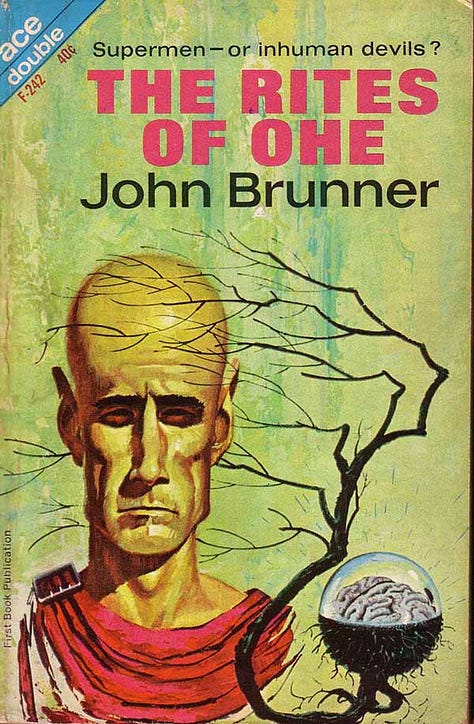
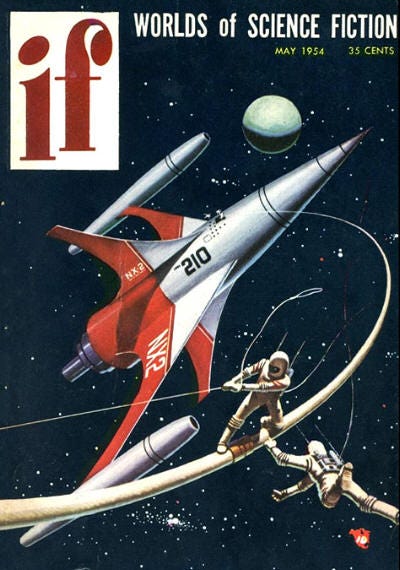
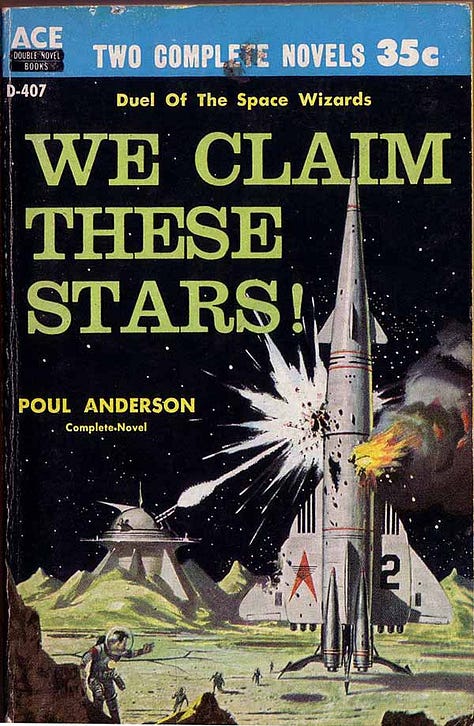
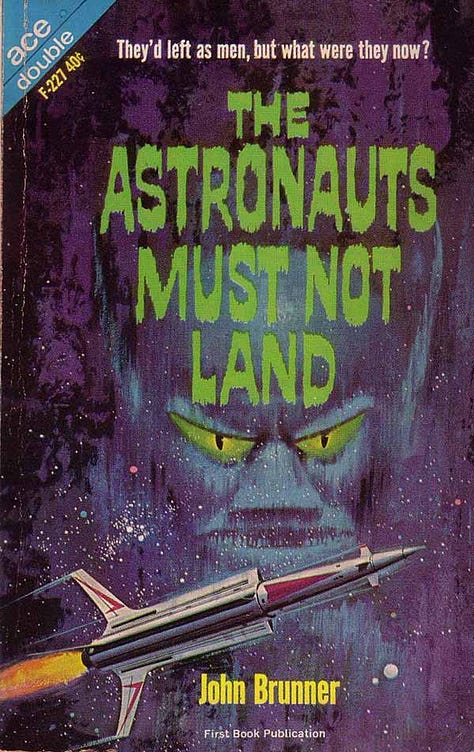
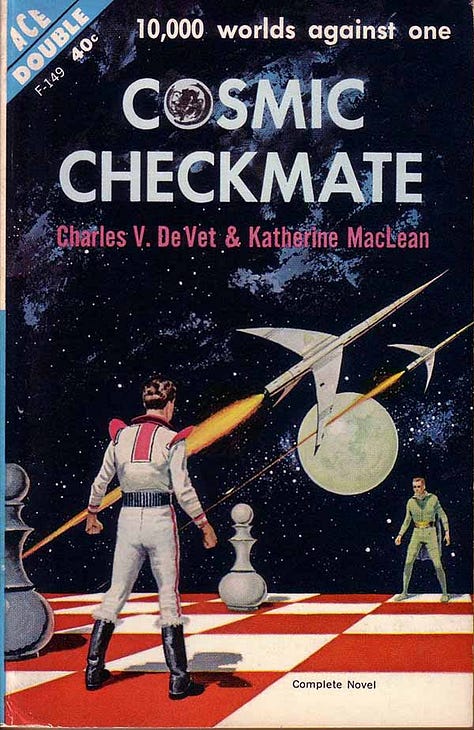
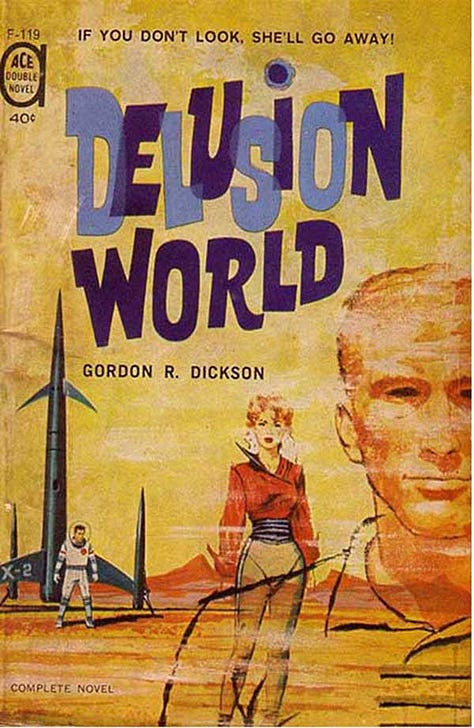
But let’s get back to Solar Lottery. We’ve talked about everything but the contents, so what’s inside?
Let’s dive in.
The waves are choppy at first, I must say. The book lurches into action. Ted Benteley the biochemist is angry, and his hoarse exclamations are all a bit sudden. What is going on? He’s been fired, we quickly learn, but that’s not really what’s upsetting him. It’s a broader dissatisfaction with the way of things. Corruption! Systemic decay! The purpose of his work! “Everyone’s a phony!” we kind of expect him to shout, in a Holden Caulfield style outburst.
Admittedly, there is quite a bit to be angry about, but we’ll get to that later.
It took me a little while to get into the flow of things with this book. You could say that the writing is “of its era,” but it’s still a bit jarring. “Boobs bobbing breathlessly” is something I have written in my notes here. Women’s breasts do actually bob as they approach. They warm them at the fire, and, at least early on, much of what they do is done “breathlessly.” There’s definitely a bit of a comical element to it.
But things pick up. You get into it. There really is a lot going on.
Benteley hasn’t just been released from employment. He’s been released from his oath of fealty, from the relationship of serf to protector—there are a few pleasingly medieval ideas floating around here. With his release, Benteley receives his power card, the mark of a free person and a one-in-six-billion shot in the great lottery, the chance to be Quizmaster (that “universal president” I vaguely remembered, so I wasn’t completely off).
However, Benteley doesn’t win that lottery, doesn’t even play in the game. Instead, he immediately takes his card over to the Directorate—he thinks things will be different there, pure of purpose and free from corruption—and he swears a new loyalty oath. He will serve the Quizmaster.
But Benteley makes a mistake. His luck, critically important in this world, is bad, specifically his timing. He winds up swearing his oath not to the position of Quizmaster but, in a critical distinction, to the person of Verrick Reese who has long held that position. He swears the oath, turns in his card, and immediately learns of what has happened. “The bottle,” the mechanism of the lottery, has “twitched,” and Reese has been “quacked.” He’s been cast down from his perch, taking poor Benteley with him, along with the rest of his subjects.
The story now moves to the man who the bottle has just elevated to Quizmaster, Leon Cartwright, and he has more than an inkling of what’s about to happen. When he hears the troops coming down through the roof, he just doesn’t know if they’ve been sent there to kill him or protect him. When he hears them coming, he’s only just dispatched the members of his society on a quasi-religious mission. Following the ideas of their founder, they will board a rickety and repurposed ore-carrier and voyage out beyond the known universe, all the way to the legendary Flame Disc, the 10th planet.
Cartwright, “electronics repairman and human being with a conscience,” is going to soon come apart under the strain of being Quizmaster—it’s a stressful job, what with the sanctioned assassins that hunt you one by one—and Reese, not at all a man of conscience, is going to pull all the strings to make sure that the very first assassin gets him. Benteley is going to be tugged along with Reese’s schemes, but always as an outsider. A lot is going to happen along the way!
I’ll be back soon to talk some more about the world that Dick created with Solar Lottery, about a curious bit of medieval myth-making that he makes use of, a disaster in San Francisco that changed everything, Dick’s own version of the infotainment industry, and much, much more.
Thank you for reading this first instalment of Other Android Dreams.
Until next time,
Devon.




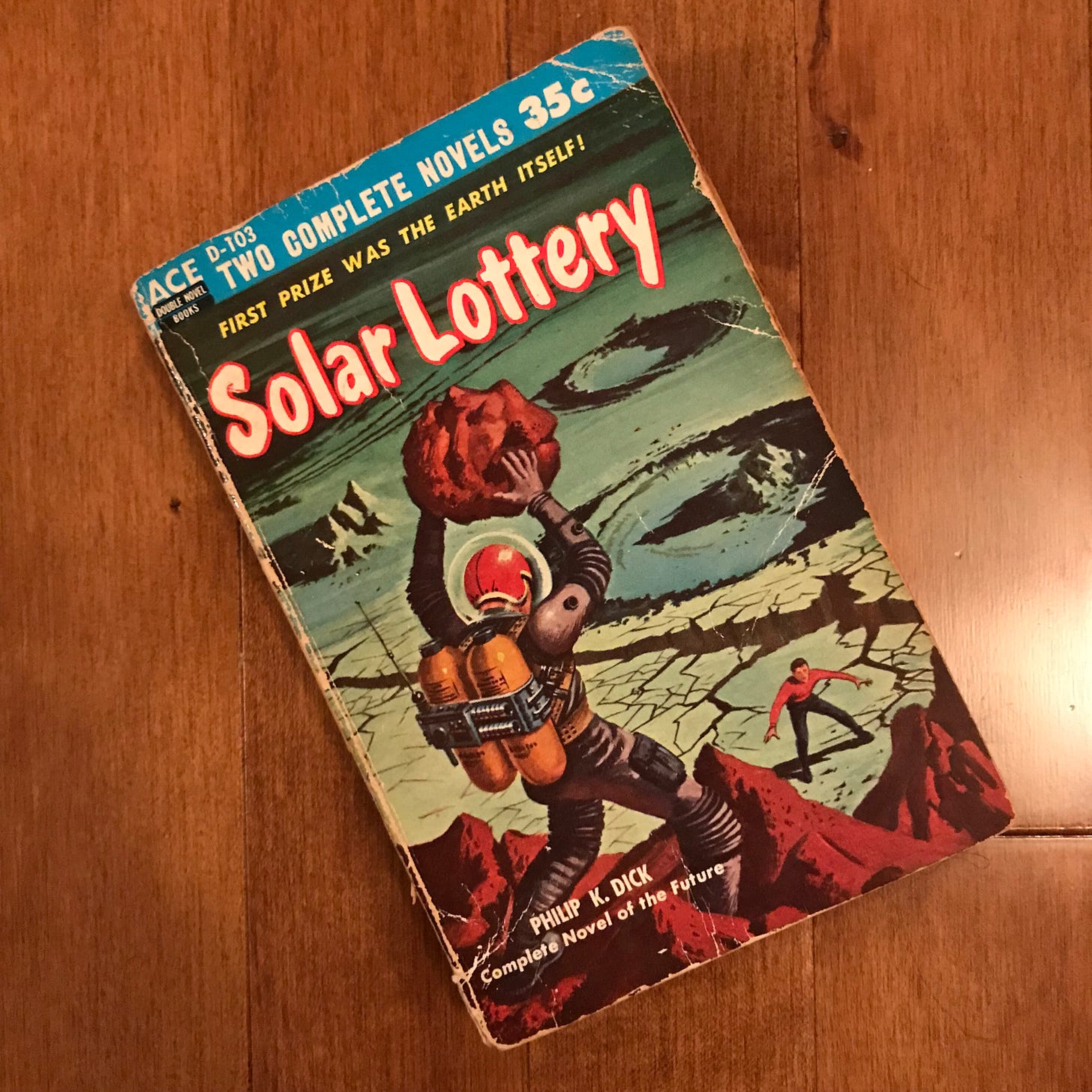


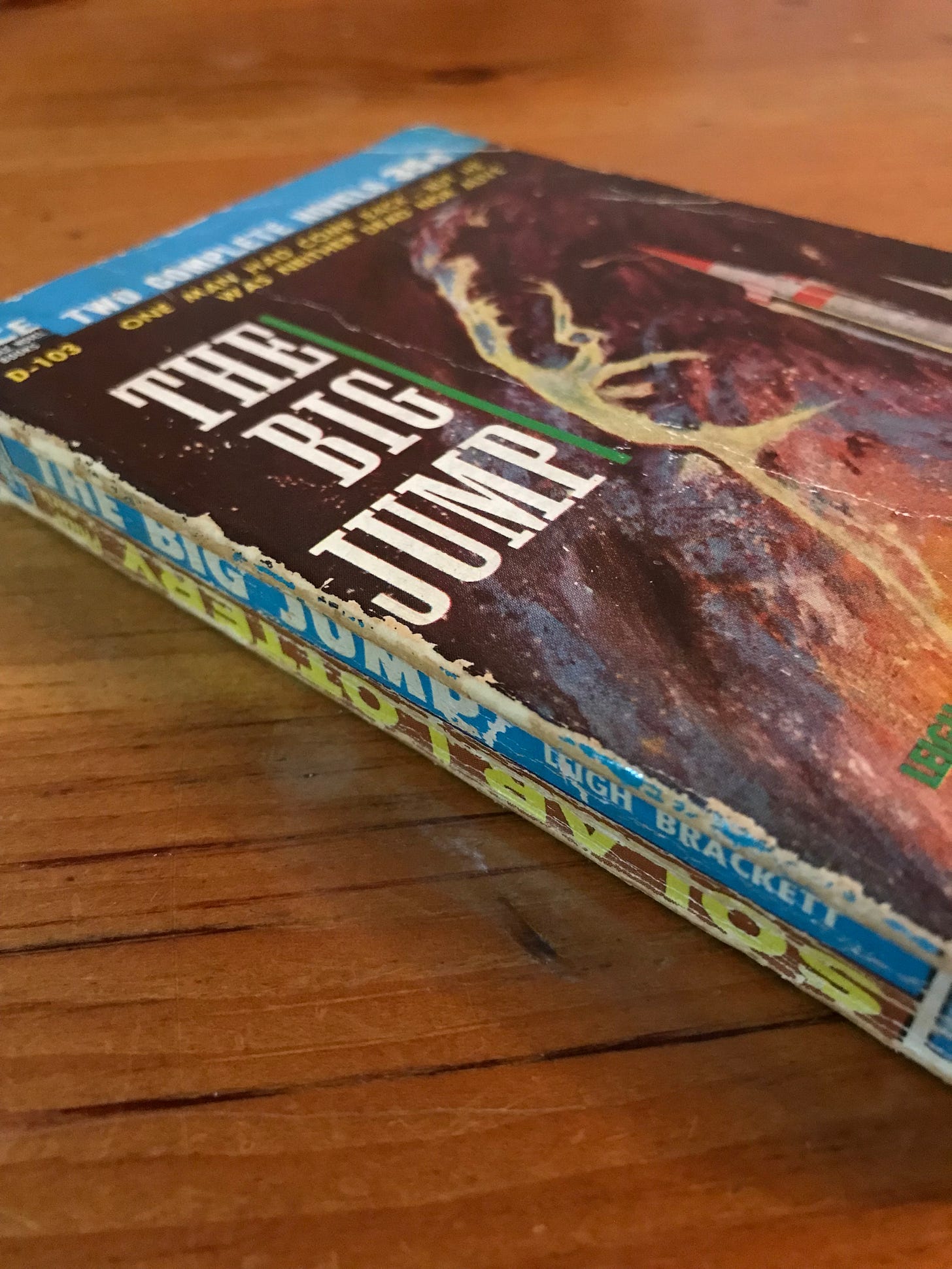
The cover hooked us, the title intrigued and your accessible and entertaining prose took us to the finishing line. Looking forward to more!
The cover of this book is epic!!!!
Great break down of Philip K Dick's first novel and love how you set the scene with going through one his short stories first. I have seen a few of the film adaptations of his work but, shamefully, never read any of his books. This has inspired me.
Thank you